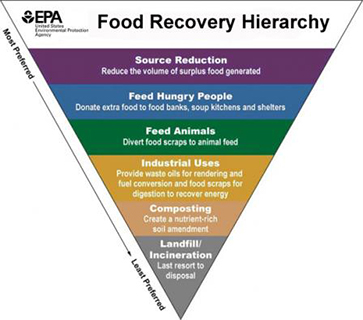Reducing the Impact of Wasted Food by Feeding the Soil and Composting
On this page
- What is Compost?
- Benefits of Compost
- Getting Started
- Composting Legal Basics for Businesses and Organizations
- Success Stories

Composting is the fifth tier of EPA's Food Recovery Hierarchy. Even when all actions have been taken to use your wasted food, certain inedible parts will still remain and can be turned into compost to feed and nourish the soil. Like yard waste, food waste scraps can also be composted. Composting these wastes creates a product that can be used to help improve soils, grow the next generation of crops, and improve water quality.
What is Compost?
Gardeners and farmers add compost to soil to improve its physical properties. They may even use compost instead of soil to grow plants. Mature compost is a stable material with a content called humus that is dark brown or black and has a soil-like, earthy smell.
Compost is created by:
- Combining organic wastes, such as wasted food, yard trimmings, and manures, in the right ratios into piles, rows, or vessels.
- Adding bulking agents such as wood chips, as necessary to accelerate the breakdown of organic materials; and
- Allowing the finished material to fully stabilize and mature through a curing process.
Mature compost is created using high temperatures to destroy pathogens and weed seeds that natural decomposition does not destroy.
Benefits of Composting
There are a number of benefits to compost that not everyone is aware of. Some examples are listed below:
- Organic waste in landfills generates, methane, a potent greenhouse gas. By composting wasted food and other organics, methane emissions are significantly reduced.
- Compost reduces and in some cases eliminates the need for chemical fertilizers.
- Compost promotes higher yields of agricultural crops.
- Compost can help aid reforestation, wetlands restoration, and habitat revitalization efforts by improving contaminated, compacted, and marginal soils.
- Compost can be used to remediate soils contaminated by hazardous waste in a cost effective manner.
- Compost can capture and destroy 99.6 percent of industrial volatile organic chemicals (VOCs) in contaminated air.
- Compost can provide cost savings over conventional soil, water and air pollution remediation technologies, where applicable.
Getting Started
It is important to know the composting process before beginning composting or starting a composting program.
- Learn more about home or backyard composting.
- Find out more about composting for organizations, businesses and communities.
Composting Legal Basics for Businesses and Organizations
Landfill Bans on Organics
Some states have bans on landfill disposal of organic materials like wasted food. The U.S. Composting Council compiles information on state compost regulations Exit.
Biosolids Composting and Use or Disposal of Sewage Sludge
The Clean Water Act covers land application, surface disposal, and combustion of biosolids sewage sludge as well as biosolids composting. EPA published federal standards for the use or disposal of sewage sludge, which can be found in title 40 of the Code of Federal Regulations (CFR) in part 503. Many of the standards in this rule may apply to municipal solid waste compost. More information can be found on EPA’s Biosolids website.
Success Stories
Disclaimer of Endorsement: Reference herein to any specific commercial products, process, or service by trade name, trademark, manufacturer, or otherwise, does not necessarily constitute or imply its endorsement, recommendation, or favoring by the United States Government. The views and opinions of authors expressed herein do not necessarily state or reflect those of the United States Government, and shall not be used for advertising or product endorsement purposes.
New Seasons Markets
New Seasons Markets operates 12 stores in the Pacific Northwest and strives to support the local economy and sustainable agriculture. Since 2006, New Seasons Market has increased diversion of organic materials, including food waste to compost by 109 percent. Since 2011, they have diverted more than 2,410 tons of food from landfills and saved more than $25,000 in waste expenses. Find out more in the case study about New Seasons Market's food donation and composting initiatives.
Petco Park
Petco Park, home to the San Diego Padres, implemented a food composting program in 2005 helping the venue to save money on its trash disposal bills. In 2011, Petco Park diverted 164 tons from landfill, saving $75,000 since 2005. Learn more from the 2012 presentation on their efforts.
Middlebury College
Middlebury College in Middlebury, Vermont initiated a food waste composting program in 1993. Middlebury College used to haul the food scraps offsite, but now have a site on campus where they compost 90 percent of the food waste generated or 370 tons in 2011. In 2011, Middlebury saved over $100,000 in landfill fees by recycling and composting. Learn more in this Biocycle article Exit.
